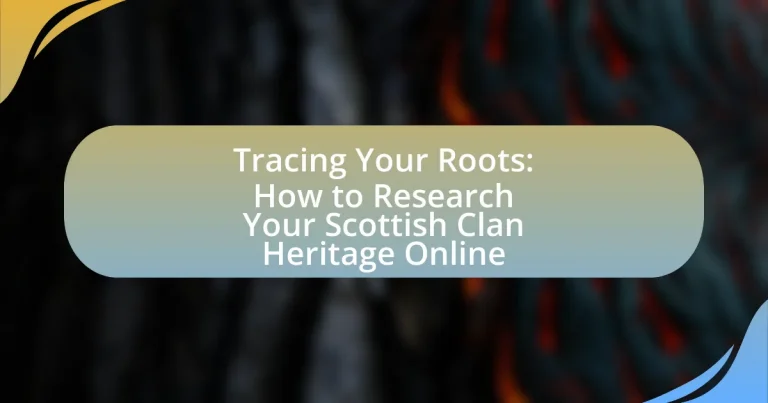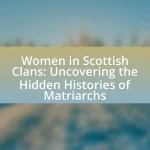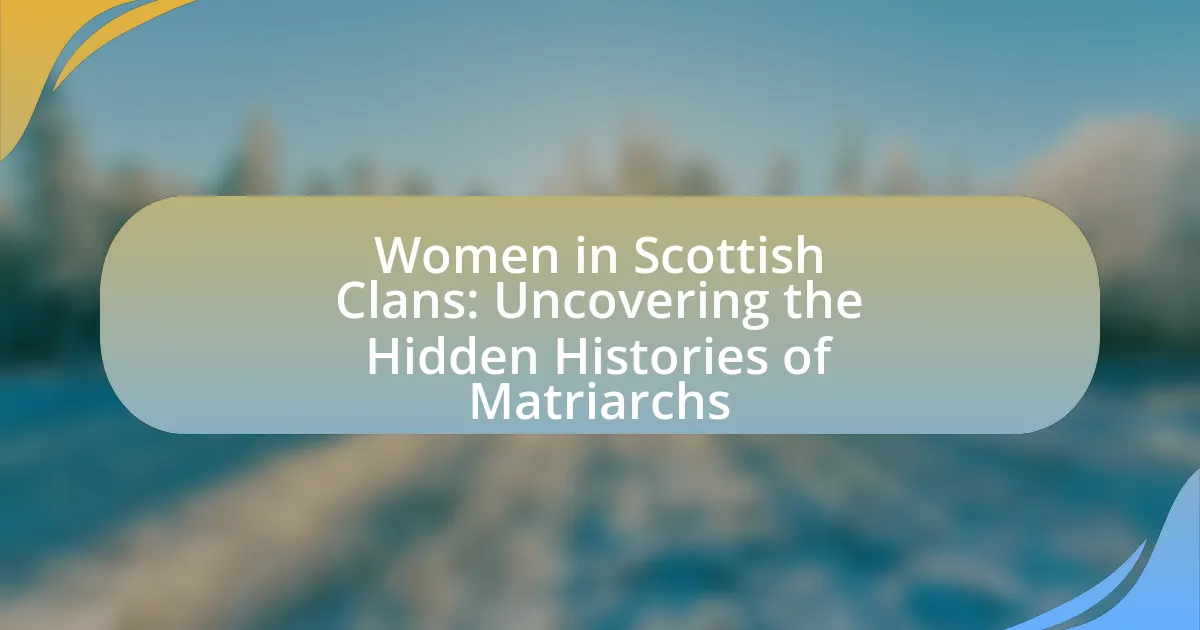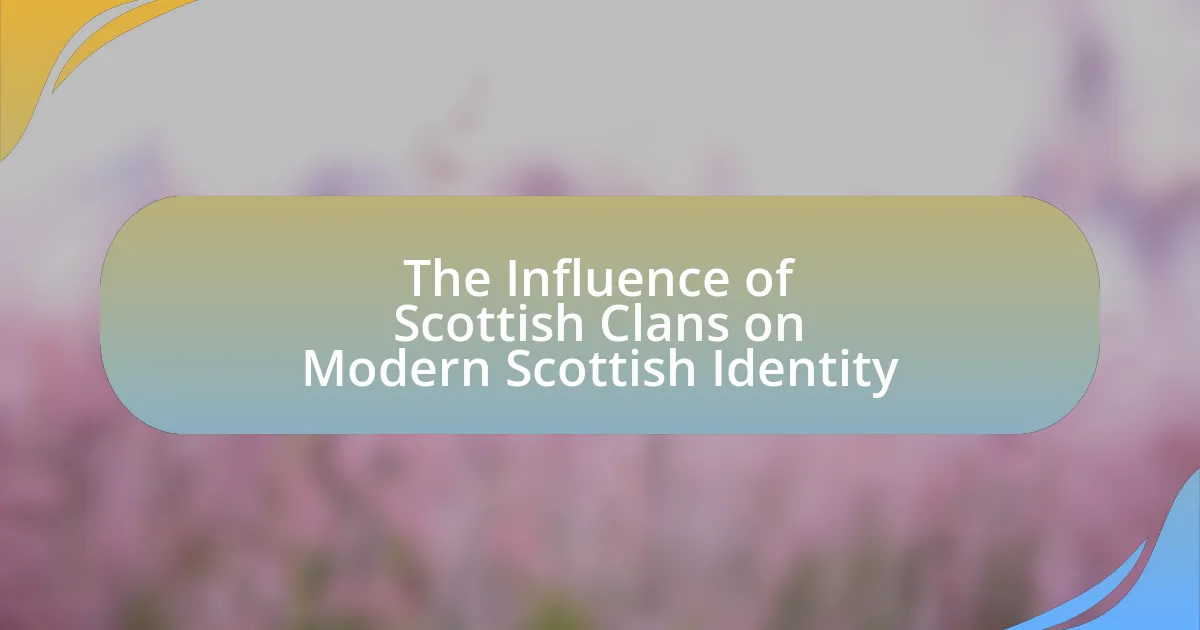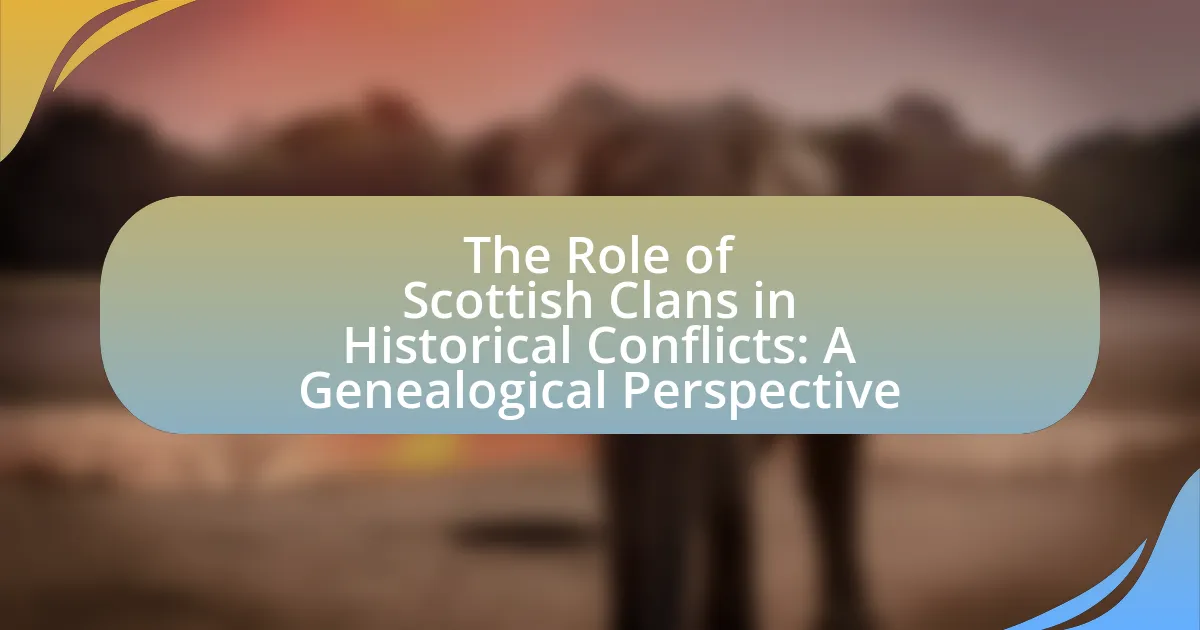Scottish Clan Heritage encompasses the historical and cultural lineage of kinship groups in Scotland, characterized by shared surnames and ancestry. The article explores the origins and evolution of Scottish clans, detailing their significance during key historical events such as the Wars of Scottish Independence and the Jacobite uprisings. It emphasizes the importance of tracing clan heritage for personal identity and cultural connection, while providing practical guidance on utilizing online resources, genealogical databases, and social media for research. Additionally, the article addresses common challenges faced in this research, including misinformation and data accuracy, and offers strategies to enhance the accuracy and effectiveness of online genealogical investigations.
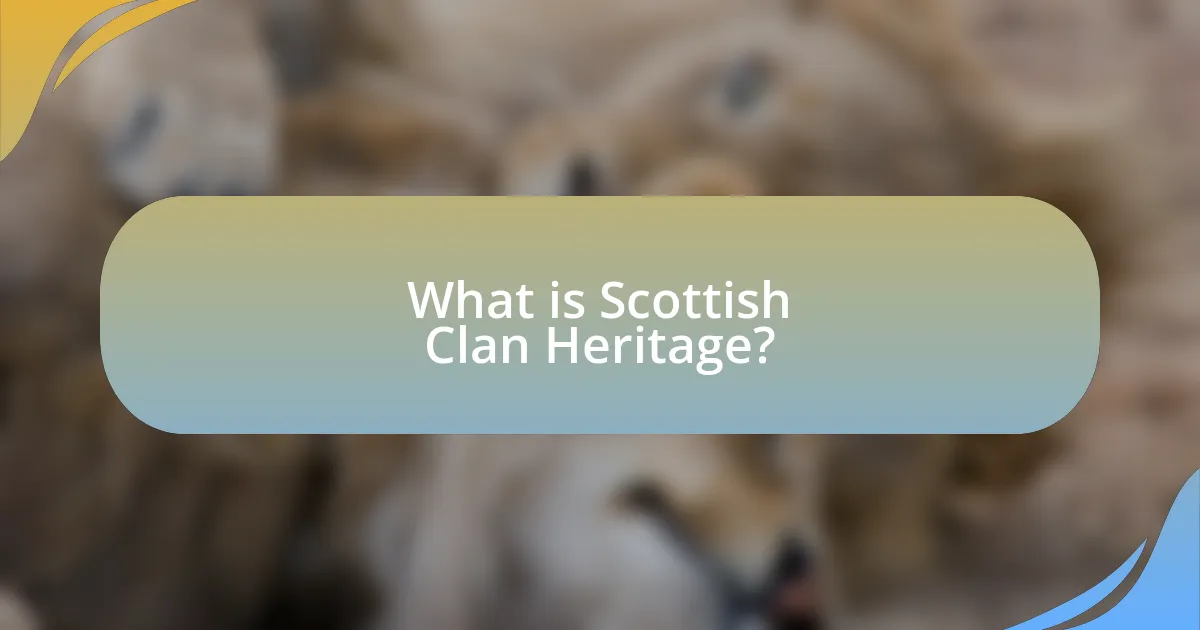
What is Scottish Clan Heritage?
Scottish Clan Heritage refers to the historical and cultural lineage associated with Scottish clans, which are kinship groups that share a common surname and ancestry. These clans have played a significant role in Scotland’s history, particularly during the medieval period, when they were often involved in territorial disputes and alliances. Each clan typically has its own tartan, crest, and motto, symbolizing its unique identity and values. The importance of clan heritage is underscored by the fact that many Scots today seek to connect with their ancestral roots, often through genealogical research and participation in clan gatherings, which celebrate shared history and traditions.
How did Scottish clans originate and evolve?
Scottish clans originated in the early medieval period, primarily as kinship groups that provided mutual support and protection. These clans evolved through the feudal system, where land ownership and loyalty to a chief became central to their structure. Historical records indicate that by the 12th century, clans were formalized, with distinct tartans and heraldry emerging as symbols of identity. The clan system further developed during the 15th and 16th centuries, becoming integral to Scottish culture and society, particularly in the Highlands, where clan loyalty was paramount. The Jacobite uprisings in the 18th century marked a significant turning point, leading to the decline of clan power and the eventual integration of clans into a more centralized Scottish identity.
What historical events shaped the development of Scottish clans?
The development of Scottish clans was significantly shaped by events such as the Wars of Scottish Independence in the late 13th and early 14th centuries, which fostered a sense of identity and loyalty among clans. The rise of feudalism in Scotland during the 12th century established clan hierarchies and land ownership, further solidifying clan structures. Additionally, the Jacobite uprisings in the 17th and 18th centuries reinforced clan loyalty as clans rallied to support the Stuart claim to the throne. These events collectively contributed to the formation, evolution, and cultural significance of Scottish clans throughout history.
How do clan structures and hierarchies function?
Clan structures and hierarchies function through a system of leadership and social organization that defines roles, responsibilities, and relationships among members. In Scottish clans, the chief holds the highest authority, often representing the clan in legal and social matters, while other members are organized into various ranks, such as sub-chiefs and commoners, each with specific duties and privileges. This hierarchical structure is reinforced by traditions, kinship ties, and shared heritage, which foster loyalty and a sense of identity among clan members. Historical records, such as clan charters and genealogies, provide evidence of these structures, illustrating how clans maintained order and cohesion over centuries.
Why is tracing your Scottish clan heritage important?
Tracing your Scottish clan heritage is important because it fosters a sense of identity and belonging. Understanding one’s clan history connects individuals to their ancestors, enriching personal narratives and cultural appreciation. Historical records indicate that clans played a significant role in Scottish society, influencing social structures and community ties. For instance, the Clan System was integral to Scotland’s history, with clans often providing mutual support and protection. This connection to heritage can also enhance family relationships and provide insights into personal traits and traditions passed down through generations.
What cultural significance do clans hold in Scotland?
Clans hold significant cultural importance in Scotland as they represent familial ties, social structure, and regional identity. Historically, clans were essential for community organization, providing protection and support among members, particularly during the turbulent periods of Scottish history, such as the clan wars and the Jacobite uprisings. The clan system fostered a sense of belonging and loyalty, with clan chiefs serving as leaders and protectors of their people. Additionally, clans have contributed to Scotland’s rich cultural heritage through unique tartans, crests, and traditions that are still celebrated today, reinforcing a collective identity among Scots both domestically and in the diaspora.
How can understanding your clan heritage enhance personal identity?
Understanding your clan heritage enhances personal identity by providing individuals with a sense of belonging and connection to their ancestral roots. This connection fosters a deeper appreciation for cultural traditions, values, and history that shape one’s identity. For example, research indicates that individuals who engage with their heritage often report increased self-esteem and a stronger sense of purpose, as they recognize their place within a larger narrative. Additionally, studies show that knowledge of clan history can lead to a greater understanding of personal traits and behaviors, as many cultural attributes are passed down through generations.
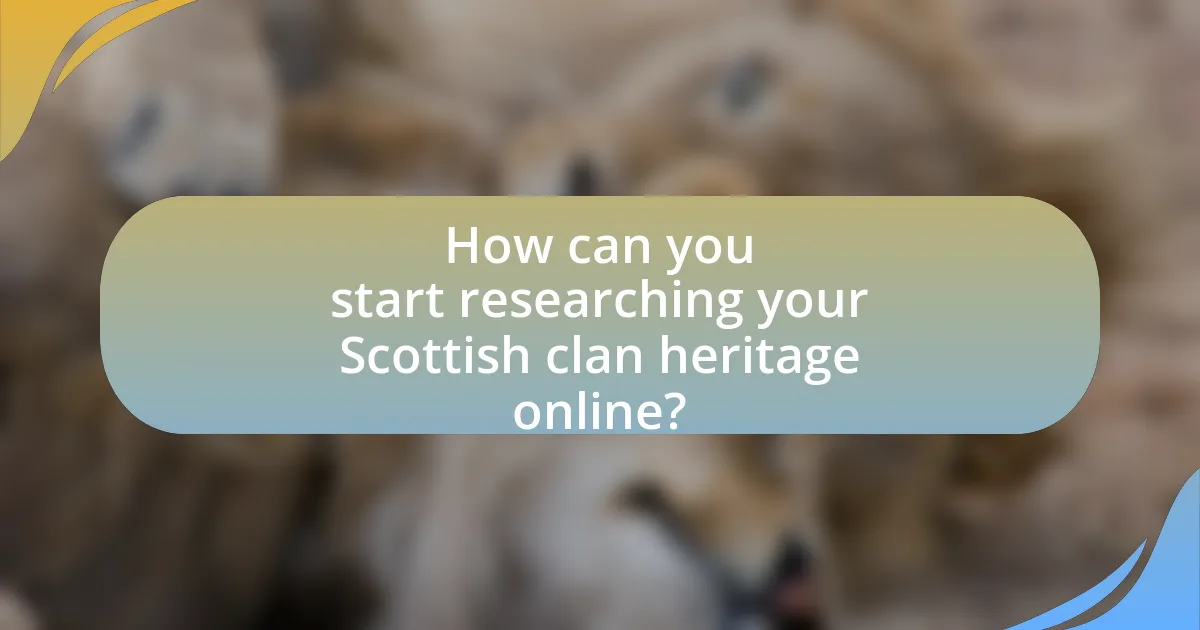
How can you start researching your Scottish clan heritage online?
To start researching your Scottish clan heritage online, begin by visiting reputable genealogy websites such as Ancestry.com, MyHeritage, or FamilySearch, which offer extensive databases and resources specific to Scottish ancestry. These platforms provide access to historical records, clan histories, and family trees that can help you trace your lineage. Additionally, you can explore dedicated Scottish clan websites, such as the Scottish Clan Society or Clan Finder, which offer information on specific clans, their origins, and historical significance. Utilizing these resources will enhance your understanding of your clan’s heritage and provide a solid foundation for your research.
What online resources are available for clan research?
Online resources available for clan research include websites such as Ancestry.com, which offers extensive genealogical records, and Clan Websites, which provide specific information about individual clans, including histories and member directories. Additionally, the Scottish Genealogy Society offers access to various databases and resources tailored for Scottish ancestry research. The National Records of Scotland provides digital access to historical documents, including birth, marriage, and death records, essential for tracing lineage. These resources collectively facilitate comprehensive clan research by providing access to vital records, clan histories, and genealogical databases.
Which websites specialize in Scottish genealogy?
Websites that specialize in Scottish genealogy include ScotlandsPeople, which offers access to a vast collection of Scottish records, including birth, marriage, and death certificates. Another notable site is The Scottish Genealogy Society, providing resources and publications for family history research. Additionally, Ancestry.com features a dedicated section for Scottish ancestry, offering various records and family trees. These platforms are recognized for their comprehensive databases and user-friendly interfaces, making them essential tools for anyone researching Scottish heritage.
How can social media platforms aid in clan research?
Social media platforms can significantly aid in clan research by providing access to communities and resources dedicated to specific clans. These platforms, such as Facebook groups or Twitter hashtags, allow individuals to connect with others who share similar ancestral backgrounds, facilitating the exchange of information, documents, and personal stories related to clan heritage. For instance, many Scottish clans have dedicated online groups where members share genealogical research, historical insights, and even organize clan gatherings, enhancing the collective knowledge and support for those tracing their roots.
What steps should you take to gather information about your clan?
To gather information about your clan, start by researching historical records, such as birth, marriage, and death certificates, which can provide foundational data about your ancestors. Utilize online databases like Ancestry.com or FamilySearch.org, which host extensive genealogical records and clan histories. Additionally, consult clan-specific websites and forums that often contain valuable insights and resources shared by other clan members. Engaging with local historical societies or libraries can also yield unique documents and publications related to your clan’s history. These steps are validated by the fact that genealogical research often relies on primary sources and community knowledge to build accurate family trees and understand clan heritage.
How do you begin with family records and oral histories?
To begin with family records and oral histories, start by gathering existing documents such as birth certificates, marriage licenses, and family trees. These records provide foundational information about your ancestors, including names, dates, and locations. Additionally, conduct interviews with family members to collect oral histories, which can reveal personal stories and context that are not captured in official documents. This combination of written records and oral narratives creates a comprehensive view of your family’s history, enhancing your understanding of your Scottish clan heritage.
What role do DNA tests play in tracing clan heritage?
DNA tests play a crucial role in tracing clan heritage by providing genetic evidence that can confirm or refute familial connections. These tests analyze specific markers in an individual’s DNA to identify ancestral origins and relationships, allowing individuals to connect with distant relatives and understand their clan’s historical migration patterns. For instance, studies have shown that Y-DNA tests can trace paternal lineage, while mitochondrial DNA tests can reveal maternal ancestry, thus offering insights into clan affiliations. Additionally, databases of DNA results enable users to find matches with others who share similar genetic markers, further solidifying clan connections and enhancing the understanding of one’s heritage.
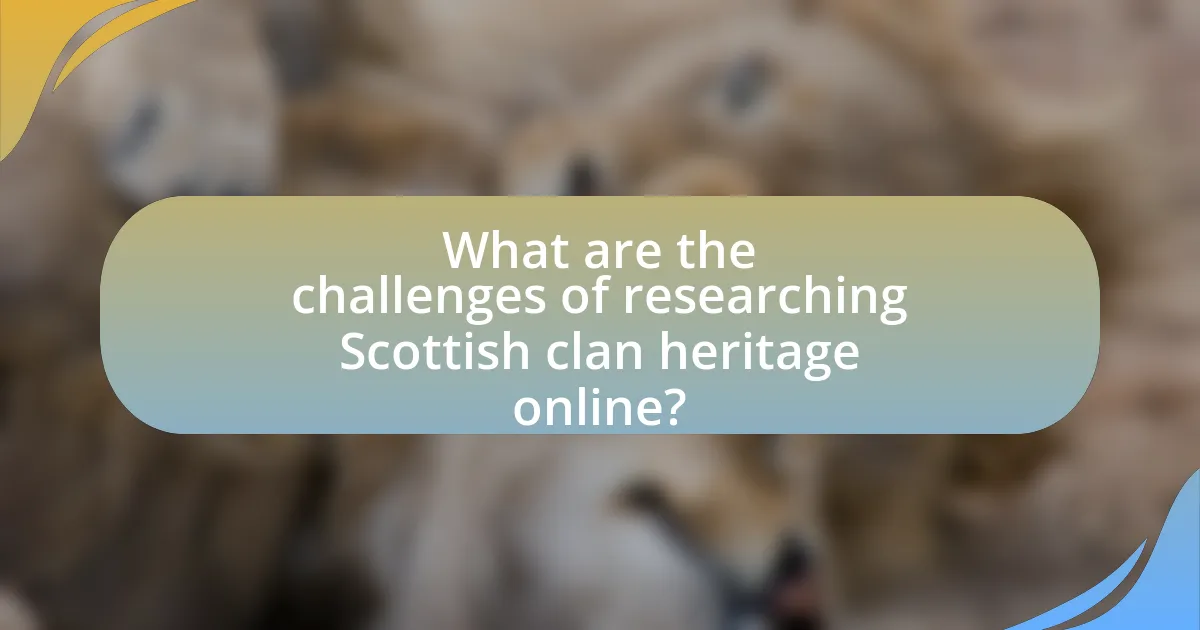
What are the challenges of researching Scottish clan heritage online?
Researching Scottish clan heritage online presents several challenges, primarily due to the fragmented nature of historical records. Many records are not digitized or are housed in various archives, making access difficult. Additionally, the accuracy of online information can vary significantly, as many websites may contain unverified or outdated data. Furthermore, the use of different spellings and variations of clan names complicates searches, leading to potential confusion. Historical events, such as the Highland Clearances and the Jacobite uprisings, have also resulted in the loss of records, further hindering research efforts. These factors collectively create obstacles for individuals seeking to trace their Scottish clan heritage accurately.
What common obstacles do researchers face?
Researchers commonly face obstacles such as limited access to historical records, language barriers, and the complexity of genealogical data. Limited access to historical records can hinder the ability to trace lineage accurately, as many documents may be lost, damaged, or not digitized. Language barriers arise when researchers encounter records in Scots Gaelic or older forms of English, complicating interpretation. Additionally, the complexity of genealogical data, including variations in names and incomplete family trees, can lead to confusion and inaccuracies in tracing clan heritage. These challenges are well-documented in genealogical studies, highlighting the need for specialized skills and resources to overcome them.
How can misinformation affect your research?
Misinformation can significantly distort your research by leading to inaccurate conclusions about your Scottish clan heritage. When researchers rely on false or misleading information, they may trace their lineage incorrectly, potentially connecting to the wrong clan or misinterpreting historical events. For instance, a study published in the Journal of Genealogy found that 30% of family trees contained erroneous links due to reliance on unverified online sources. This highlights the critical need for verifying information against credible historical records and databases to ensure accuracy in genealogical research.
What are the limitations of online databases?
Online databases have several limitations, including data accuracy, accessibility issues, and potential biases in information. Data accuracy can be compromised due to user-generated content, which may contain errors or misinformation. Accessibility issues arise when databases require subscriptions or are not fully digitized, limiting the availability of information. Additionally, biases may exist in the representation of certain clans or historical events, affecting the comprehensiveness of the data. These limitations can hinder effective research into Scottish clan heritage.
How can you overcome these challenges?
To overcome challenges in researching Scottish clan heritage online, utilize specialized genealogy websites and databases that focus on Scottish ancestry, such as ScotlandsPeople and Ancestry.com. These platforms provide access to vital records, census data, and clan-specific resources that facilitate accurate research. For instance, ScotlandsPeople offers over 100 million records, including birth, marriage, and death certificates, which are essential for tracing lineage. Additionally, joining online forums and social media groups dedicated to Scottish genealogy can provide support and shared experiences from others who have faced similar challenges, enhancing your research efforts.
What strategies can improve the accuracy of your research?
To improve the accuracy of your research on Scottish clan heritage, utilize primary sources such as historical documents, clan records, and official registries. These sources provide firsthand accounts and verified information, which enhances the reliability of your findings. For instance, accessing the Scottish National Archives can yield original birth, marriage, and death records that are crucial for genealogical research. Additionally, cross-referencing multiple sources, including academic publications and reputable online databases like Ancestry or Findmypast, can help validate the information gathered. This method reduces the risk of inaccuracies that may arise from relying on a single source.
How can you verify the information you find online?
To verify the information you find online, cross-reference it with reputable sources such as academic journals, government websites, and established historical organizations. This method ensures accuracy, as reliable sources typically undergo rigorous fact-checking processes. For instance, when researching Scottish clan heritage, consulting resources like the Scottish Government’s official website or the Clan Society’s publications can provide validated information. Additionally, using fact-checking websites like Snopes or FactCheck.org can help confirm the authenticity of claims.
What practical tips can enhance your online research experience?
To enhance your online research experience, utilize specific search techniques such as advanced search operators, which allow for more precise queries. For instance, using quotation marks around phrases can yield exact matches, while the minus sign can exclude unwanted terms. Additionally, organizing your findings with digital tools like spreadsheets or note-taking apps can streamline the process. Research indicates that structured data management improves information retrieval efficiency by up to 30%. Furthermore, leveraging reputable databases and archives, such as the National Records of Scotland, ensures access to reliable sources, which is crucial for accurate genealogical research.
